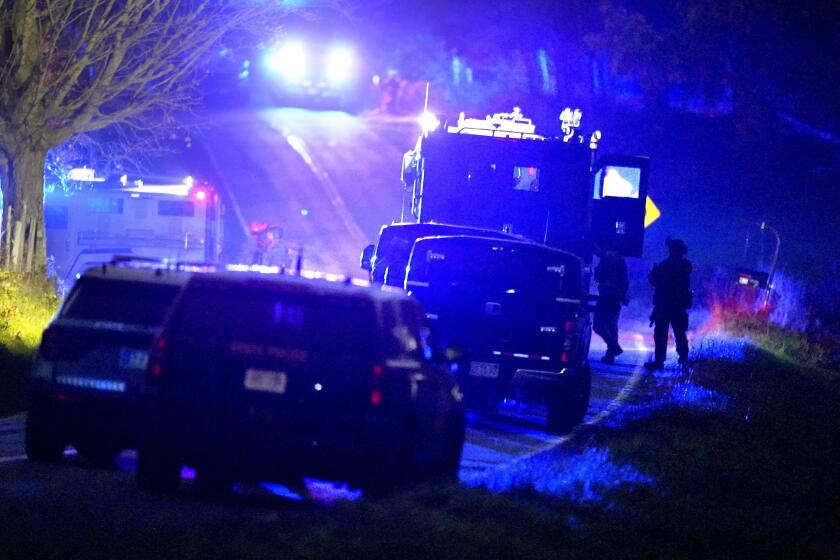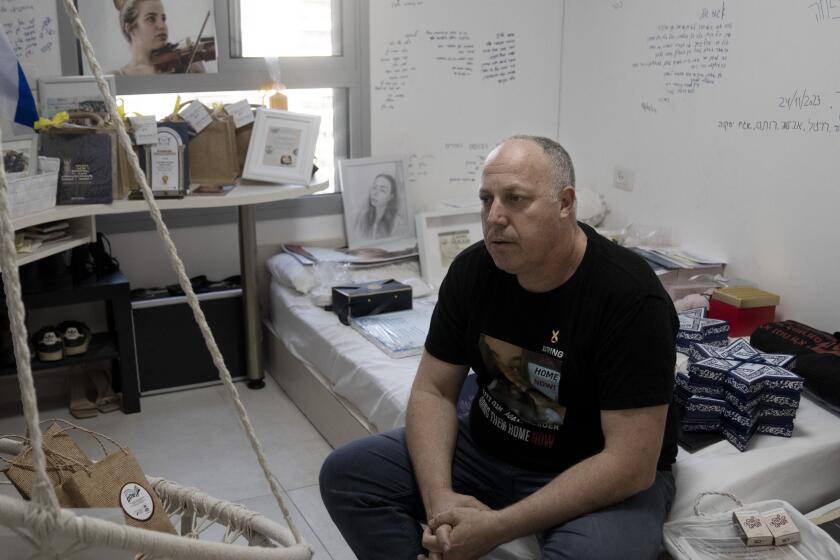Kadafi loses another city to Libyan opposition
Moammar Kadafi’s tenuous grip on Libya was further loosened when the city closest to the capital fell under the control of rebel forces, leaving Tripoli encircled by opponents determined to topple the dictator’s 41-year regime.
Zawiya, a city of 210,000 just 30 miles west of Tripoli, was shaping up to be a potential focal point for clashes as anti-government forces with tanks and antiaircraft guns massed throughout the city center Sunday, and Kadafi forces surrounded the outskirts with tanks and military checkpoints, residents said.
From the east, small bands of armed men traveled in the direction of the capital from Benghazi, the city that gave birth to the 11-day uprising.
“This standoff may drag on for some time, and it may become much, much uglier,” said Paul Sullivan, a regional expert at Georgetown University who has studied Libya for years. “The international community is going to continue to be placed in a very difficult position.”
The developments in Libya occurred as the wave of unrest continued Sunday throughout North Africa and the Middle East, enveloping the usually sleepy gulf sultanate of Oman, where government forces were blamed for at least two protesters’ deaths.
The world’s focus, however, remained on Libya as military and civilian leaders in Benghazi, the rebel capital, said they had no immediate plans to send large groups of fighters to Tripoli to assist other rebels besieging the capital. Instead, individual fighters have gone on their own.
Khaled ben Ali, an organizer of the provisional government in Benghazi where the eastern uprising against Kadafi erupted Feb. 17, said a total of about 300 men are traveling in small groups in private cars, with little or no coordination among them or with protesters in Tripoli.
At a Benghazi army barracks, rebels collected weapons — including antiaircraft guns and Kalashnikov rifles — taken from Kadafi loyalists. There was continuous talk about going to Tripoli, but no serious effort has been mobilized, air force Col. Ahmed Omar said.
“Our bodies are here, but our hearts are in Tripoli,” he said. “We are thinking, the idea has been there since the first day Benghazi was liberated, trying to get to Tripoli.”
A few men phoned the provisional government center in Benghazi’s central courthouse Sunday to report that they had arrived on the eastern outskirts of Tripoli, Ben Ali said. But the vast majority of men have not been heard from since leaving Benghazi over the last several days, other officials said.
Most of the fighters are impassioned young men eager to play a role in deposing Kadafi. A few are soldiers who defected from Kadafi’s army, Ben Ali said, adding that leaders of the rebellion don’t fully trust them.
On Saturday, he said, an army general contacted opposition fighters in the coastal city of Misurata, about 120 miles east of Tripoli. The general claimed to be defecting from the Kadafi regime but arrived with loyalist soldiers and killed several opposition fighters, Ben Ali said.
Inside Tripoli, the situation was grim. Two-hour lines awaited people seeking bread or fuel. Official forces melted away to be replaced by young men or teenagers who were armed by Kadafi, giving the city a sense of wild unpredictability.
“The city is controlled by these mad dogs. They make it absolutely impossible to enunciate any view against the government,” a sobbing 62-year-old businessman said by phone.
Yet no one expected Kadafi to fall easily. He gave a rambling interview to Serbian television vowing to fight on, and son Seif Islam continued his appearances on state broadcasts to assert that the government was regaining control.
The Kadafi government attempted to appease the uprising with an announcement on state television Sunday that $400 grants would be distributed to each Libyan family as part of the “beginning of the redistribution of oil wealth to Libyans.” But long lines of people at the banks were turned away, residents said.
Efforts by foreign governments inside Libya were isolated and aimed at bringing relief to their own citizens.
Germany said it performed secret rescues, when planes fetched more than 100 people from a private runway, its foreign minister announced Sunday. The British said they again used three aircraft at multiple locations in the eastern Libyan desert to spirit away another 150 Britons. A similar, earlier operation was also successful.
Sen. John McCain (R-Ariz.) said during an appearance on NBC’s “Meet the Press” that the American government should provide “the so-called provisional government, and there will be one, with the equipment and materiel that they could use.” Such action, he said, “would be a very strong signal.”
The United Nations Security Council named names — and birthdays and passport numbers — in a resolution Saturday freezing assets and imposing travel bans on members of the Kadafi regime. By giving such exact information, the resolution lends some insight into who is controlling the foundering regime. The U.N. also referred their actions to the International Criminal Court.
Kadafi decried the U.N. action as “null and void.”
Meanwhile, regional unrest continued to expand, with new violence igniting in Oman, a monarchy where protest is extremely rare.
Sultan Qaboos bin Said, who has reigned over the country for 40 years, reshuffled his Cabinet over the weekend, changing six ministers, and ordered some social reforms amid rare, deadly protests and growing unrest in the small Persian Gulf nation.
The sultan’s actions came a day before two people were reportedly killed and 10 others wounded in clashes between demonstrators and security forces at a protest in Oman’s largest industrial city, Sohar, on Sunday. Some reports said the government used rubber bullets; others said it was live ammunition.
The protesters, numbering in the hundreds and calling for democratic reforms, blocked traffic and broke streetlights.
In Saudi Arabia, more than 100 leading academics and activists called on the king to enact a constitutional monarchy and sweeping reforms, continuing a years-long quest that has imprisoned some of them.
King Abdullah offered small concessions, giving permanent contracts to temporary government workers. This month he offered nearly $36 billion in additional benefits to low-income Saudis.
In Yemen, President Ali Abdullah Saleh rallied tribes after one of the nations’ most prominent tribal leaders said he was joining the opposition. At least 11 other tribal sheiks responded by publicly pledging their allegiance to the president. The heavily armed tribes are often considered more powerful than the army in the gulf country.
In Egypt, Amr Moussa, who recently said he was leaving his post as chief of the Arab League, announced his candidacy for president. The former foreign minister is believed to be a formidable candidate whose populist touch and strong stands against Israel have endeared him to many.
The announcement came after a recommendation by the constitutional reform panel to change who decides who can run for president. Former President Hosni Mubarak’s party used to hold that power exclusively.
The changes, subject to a national referendum, were designed to allow more competition and to impose a two-term limit on future presidents.
In Iran, a human rights group reported that two opposition leaders and their wives were abducted by government forces, drawing condemnation from the Obama administration.
Times staff writer Alana Semuels in Los Angeles and special correspondent Haley Sweetland Edwards in Sana, Yemen, contributed to this report.
More to Read
Start your day right
Sign up for Essential California for news, features and recommendations from the L.A. Times and beyond in your inbox six days a week.
You may occasionally receive promotional content from the Los Angeles Times.








